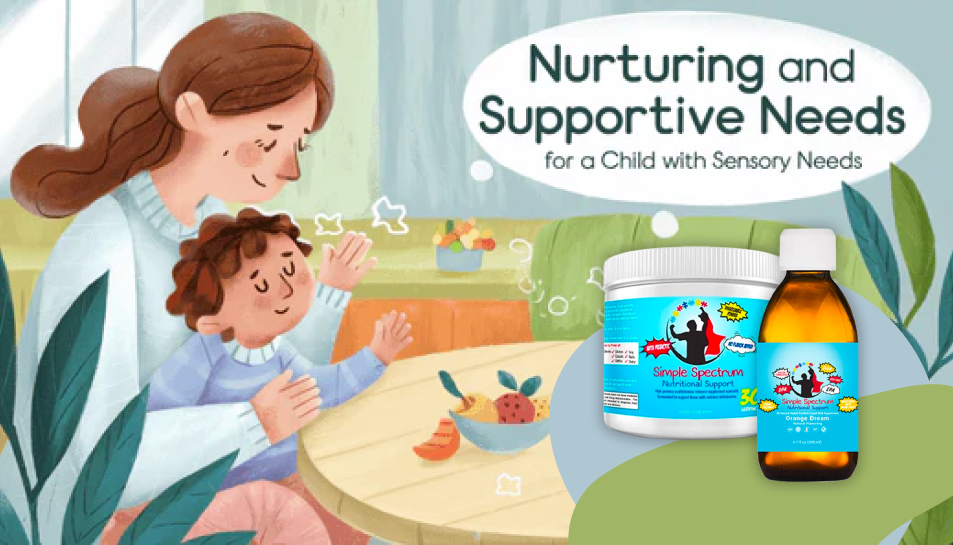
Folate is a crucial nutrient in children's diets, playing a vital role in their growth and development. It is particularly important for kids with sensory needs, as it supports brain function and overall health. Understanding the symptoms of folate deficiency is essential for parents and caregivers to ensure their children receive the nutrients they need. Simple Spectrum is dedicated to helping families by providing resources and high-quality supplements tailored for children with sensory needs.
Understanding Folate and Folic Acid
Folate and folic acid are often mentioned together, but they are not the same. Folate is a natural vitamin B9 in foods, and folic acid is a man-made version found in supplements and added to foods. Both are important for brain growth and health.For a detailed comparison, you can refer to Folic Acid vs. Folate - What's the difference?. These nutrients help in the production of DNA and other genetic material, making them essential for growth and development, especially in children.
Folate Deficiency Symptoms in Children
When children don't get enough folate, they may show signs of deficiency that can impact their daily lives. Recognizing these symptoms of folate deficiency early can help in addressing the deficiency effectively. Common symptoms of a folic acid deficiency in children include:
- Fatigue: Children may feel unusually tired or lack energy, which can affect their play and learning activities.
- Irritability: A lack of folate can lead to mood changes, making children more irritable or easily upset.
- Developmental Delays: Folate is important for brain growth, and not having enough can slow thinking or physical growth.
- Poor Growth: Insufficient folate can affect a child's overall growth and development.
- Anemia: Folate deficiency can lead to a type of anemia, causing paleness and weakness.
For more detailed information on symptoms of folate deficiency and recommended intake, visit the Folate - Health Professional Fact Sheet.
Causes and Importance of Addressing Folate Deficiency
Folate deficiency in children can arise from several causes, and understanding these reasons for folate deficiency can help in prevention and treatment:
- Poor Diet: Children who don't consume enough folate-rich foods may develop a deficiency.
- Absorption Issues: Some health conditions can affect how the body absorbs folate, leading to a deficiency.
- Increased Needs: During periods of rapid growth, children may need more folate than usual.
Fixing folate deficiency is important for kids' long-term health. If left untreated, it can lead to serious health issues, including developmental problems and learning difficulties. These effects can be more pronounced in children with sensory needs, as folate plays a key role in brain development and function.
Folate is especially important during pregnancy and early childhood, as highlighted by Johns Hopkins Medicine. Ensuring adequate folate intake during these critical periods can support healthy brain development and prevent potential deficiencies later on.
Dietary Sources of Folate
Ensuring your child gets enough folate can be achieved through a balanced diet rich in folate-containing foods. Here are some excellent sources:
- Leafy Greens: Spinach, kale, and romaine lettuce are packed with folate.
- Citrus Fruits: Oranges, lemons, and grapefruits provide a good amount of folate.
- Beans and Lentils: Chickpeas, black beans, and lentils are great plant-based sources.
- Avocados: This creamy fruit is not only delicious but also rich in folate.
- Broccoli: A versatile vegetable that can be added to many dishes for a folate boost.
- Nuts and Seeds: Sunflower seeds and peanuts are easy snacks that contribute to folate intake.
For more information on dietary sources of folate, you can refer to the Folate - Health Professional Fact Sheet.
Supporting Kids' Sensory Needs with Nutrition
Nutrition plays a vital role in supporting children with sensory needs. A balanced diet helps overall health and supports brain growth and sensory processing. Here’s how folate and other nutrients can help:
- Brain Development: Folate is essential for the developing brain, helping to form neurotransmitters that affect mood and behavior. It is a key component in folate brain health.
- Sensory Processing: Adequate nutrition supports the nervous system, which is crucial for processing sensory information.
- Overall Health: A diet rich in essential vitamins and minerals helps maintain energy levels and reduce irritability.
Incorporating a variety of nutrients, including folate, into your child's diet can make a significant difference in managing sensory needs. Simple Spectrum offers a range of products designed to support these needs, ensuring your child gets the nutrients they require for optimal development.
Conclusion and Next Steps
Recognizing and addressing folate deficiency symptoms in children is crucial for their overall health and development. Folate is important for brain growth and can greatly affect kids with sensory needs. By ensuring that your child receives adequate folate through a balanced diet or supplements, you can support their sensory processing and overall wellness.
At Simple Spectrum, we are committed to helping families navigate the nutritional needs of their children. Our Nutritional Support and Omega 3 DHA Supplements give important nutrients for brain growth and sensory needs.
We invite you to join the Simple Spectrum community for more resources and support. Together, we can ensure that your child receives the best nutritional care possible.
